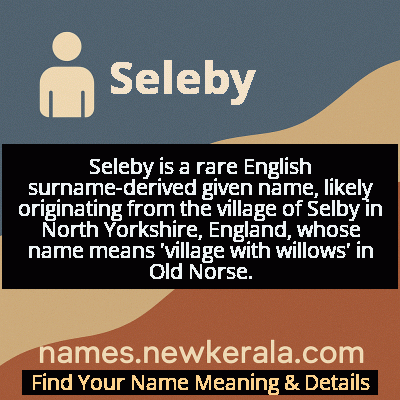Seleby Name Meaning & Details
Origin, Popularity, Numerology Analysis & Name Meaning of Seleby
Discover the origin, meaning, and cultural significance of the name SELEBY. Delve into its historical roots and explore the lasting impact it has had on communities and traditions.
Name
Seleby
Gender
Male
Origin
Christian
Lucky Number
5
Meaning of the Name - Seleby
Seleby is a rare English surname-derived given name, likely originating from the village of Selby in North Yorkshire, England, whose name means 'village with willows' in Old Norse.
Seleby - Complete Numerology Analysis
Your Numerology Number
Based on Pythagorean Numerology System
Ruling Planet
Mercury
Positive Nature
Adventurous, dynamic, curious, and social.
Negative Traits
Restless, impatient, inconsistent, prone to indulgence.
Lucky Colours
Green, white.
Lucky Days
Wednesday.
Lucky Stones
Emerald.
Harmony Numbers
1, 3, 9.
Best Suited Professions
Sales, marketing, travel, entertainment.
What People Like About You
Versatility, charisma, adventurous spirit.
Famous People Named Seleby
Seleby of York
Medieval Clergyman
Recorded in the Domesday Book as landowner in Yorkshire, establishing early Christian settlements
Sir William Seleby
Knight and Landowner
Crusader who fought in the Holy Land and later established monastic lands in Northern England
Thomas Seleby
Architect
Designed several notable manor houses in the Tudor style throughout Yorkshire
Dr. Edward Seleby
Physician and Scholar
Published influential medical texts and established early public health initiatives in rural communities
Name Variations & International Equivalents
Click on blue names to explore their detailed meanings. Gray names with will be available soon.
Cultural & Historical Significance
The name appears in the Domesday Book and various ecclesiastical records, particularly in Yorkshire and Lincolnshire, where Seleby families were often patrons of local churches and monastic institutions. This connection to land management and Christian stewardship created a cultural legacy that associated the name with reliability, tradition, and spiritual groundedness throughout English history. The Protestant Reformation saw many Seleby families maintaining their Christian commitments while adapting to changing religious landscapes, further cementing the name's association with steadfast faith and community leadership across centuries of English history.
Extended Personality Analysis
Individuals named Seleby are typically characterized by a strong sense of responsibility and grounded practicality, reflecting the name's origins connected to land stewardship and manor management. They often exhibit natural leadership qualities combined with a methodical approach to problem-solving, making them excellent organizers and reliable decision-makers. Their connection to the name's historical roots often manifests as respect for tradition and family heritage, while their practical nature enables them to adapt these values to modern contexts.
Seleby's tend to be community-oriented individuals who value stability and long-term planning, often serving as pillars in their social or professional circles. They typically possess a quiet confidence rather than overt ambition, preferring to lead through competence and reliability rather than charisma alone. This combination of traditional values and practical intelligence makes them particularly effective in roles requiring patience, persistence, and careful management of resources or relationships. Their inherent sense of duty often extends to family, community, and spiritual life, creating individuals who are both dependable and deeply principled in their approach to life's challenges.
Modern Usage & Popularity
In contemporary times, Seleby remains a relatively rare but respected name, primarily found in English-speaking countries with strong historical connections to the United Kingdom. While it has never reached mainstream popularity charts, it maintains a steady presence as a traditional choice among families with English heritage or those seeking names with historical depth and Christian significance. Modern usage often reflects a trend toward reviving older, location-based names that carry a sense of heritage and stability. The name has seen slight increases in usage among parents interested in unique but meaningful names that aren't overly common, particularly in regions like Yorkshire, East Anglia, and among British expatriate communities. Social media and genealogy research have contributed to renewed interest in such historically significant names, with Seleby appealing to those who value the combination of Christian tradition, English heritage, and distinctive character.
Symbolic & Spiritual Meanings
Symbolically, Seleby represents stewardship, stability, and rootedness, drawing from its original meaning connected to manor houses and land management. The name embodies the concept of earthly responsibility as a reflection of spiritual duty, making it symbolic of the Christian ideal of caring for God's creation while maintaining one's spiritual commitments. Metaphorically, it suggests a bridge between the physical and spiritual realms—the manor house representing earthly home and community, while its Christian associations point toward heavenly stewardship. The willow element in some interpretations adds layers of symbolism including flexibility, resilience, and growth near water sources, representing emotional depth and adaptability. Overall, Seleby carries connotations of reliability, tradition, and the enduring value of maintaining both physical and spiritual foundations across generations, making it a name rich with metaphorical meaning for those who bear it.

